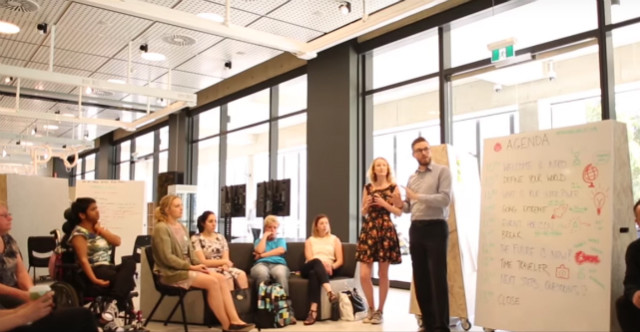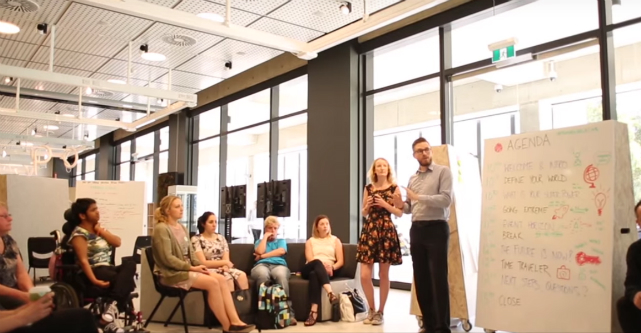“My disability is not always visible”: How to create an inclusive workplace for people of all abilities – StartupSmart

By Catherine Brooks
I’m a 31-year-old partner (now 33) at law firm Moores, a co-founder of an online beauty business called Natural Supply Co, a mother to a little boy, and I live each and every day struggling with a disability.
This is an updated version of my ‘coming out’ story, which I first shared with the legal community in 2015.
The reaction since sharing this story has been phenomenal. I’ve been contacted by a surgeon in the US, human rights activists in Canada, barristers in Brisbane and Sydney, law students across the country and a number of young people living with a disability.
Accepting my disability has been a long process.
One that will be ongoing for the rest of my life. Because my disability is not always visible and because it doesn’t affect me every day, sometimes I can ignore it.
However, I’ve learnt that that’s not a very clever long-term strategy because disabilities need daily maintenance and monitoring.
They are extremely needy and annoying. I’m still just working all of this out (over 10 years later).
So why hide my disability?
I previously hid the fact that I have multiple sclerosis because I feared workplace discrimination. Pretty ironic really, given that I’m an accredited specialist in workplace relations law.
I just never wanted the situation to arise where someone thought, ‘I’m not going to give Catherine that file/new matter/new client because of her disability’, or ‘we’d better not put too much pressure on Catherine as it might exacerbate her illness’.
I was worried I’d miss out on opportunities. I feared it would affect my career advancement (hence why I’m writing this after I was made a partner).
So my mum and I made a pact: if I ever needed more sick leave than the allotted 10 days of personal leave each Australian gets, then I would tell my employer out of fairness for workplace planning issues and for my own recuperation.
Luckily for me, I haven’t yet needed the full 10 days.
Ok that’s not true. I probably did need it at certain times but I’m very good at getting incredibly sick on my annual leave or limping (sometimes literally) through the work week and then collapsing on the weekend (the couch is one of my favourite places and don’t even get me started on how much I love TV series and talking books – the perfect distraction).
Being in the closet about my disability was actually really lonely
So my career progressed whilst I stayed in the closet and I struggled through my work years rarely telling a soul.
This is a lonely way to live with a disability. For those of you that have been braver than I and have ‘come out’ much earlier, you’ll know that as soon as you tell people you’re struggling, they’ll share with you their struggles.
When you ‘come out’ people relate to you, show you empathy, give you compassion and strength and sometimes a shoulder to cry on.
Everyone is battling with something.
Yes, sometimes people ask really stupid questions or make ignorant statements about conditions they know nothing about.
Like the woman who grew up down the road from our family who told me I shouldn’t catch public transport anymore as I might give her children my illness.
But these too are opportunities. Opportunities for us to debunk the myths around disability.
Most of us actually have some kind of disability, don’t we? Anyone reading this wearing glasses?
But being in the closet is safe
Unfortunately there’s still a lot of discrimination in our society when it comes to disability.
Many of us hold legitimate fears about ‘coming out’ because of the impact it will have on our work and friendships.
So how do we fix this? We need to debunk the myths around disability.
Debunking the myths about disability
Here are some myths that we can immediately debunk:
Disability is visible
Wrong. Not everyone has a disability that is visible. Many chronic illnesses are invisible to the naked eye. This doesn’t mean that they’re any less debilitating.
Your life is over when you are diagnosed with a disability
Wrong. Your life is also not over, even if your mobility is restricted (anyone who has met my mum will tell you that).
There’s little we can do to help people that have a disability
Wrong. Each and every one of us can help debunk the myths and stigma associated with having a disability.
How to create a more inclusive workplace
Here’s what I reckon we need to do more of as professionals to create more inclusive workplaces for people with disabilities.
1. Encourage people to talk about their disability and celebrate diversity.
2. Ensure that you have facilities (buildings, meeting rooms and toilets) that accommodate for people with disabilities and only use conference centres that provide such services. Always make sure you check for steps and disabled-access toilets before any meetings to avoid embarrassment (or justified anger). As consumers we can talk with our feet and congratulate with our purse.
3. Use the right language, it does matter. I’m a person with a disability, NOT a disabled person. Big difference. (I also now like the term “differently abled”)
4. Hire people with disabilities. Make proper accommodations and reasonable adjustments in your workplace. Be loud and proud about inclusion and equal employment opportunity policies. Don’t just give them lip-service. Get on the front foot and be proactive when it comes to helping people with a disability in your workplace. You’ll be rewarded with a greater pool of employees in the current skills shortage.
5. Be kind. One day you might require assistance too. If you see someone struggling, be brave and speak to them. Most employers now offer Employee Assistance Programs and free counselling. If you work with someone in a wheelchair, think about what life is like in their shoes. It might be easier for you to get them their afternoon cup of tea if you’re around. It’s the simple gestures that will help you break down the walls.
If we demand better access, greater inclusion and minimise the prejudice, then people like me might come out of the disability closet a lot earlier.
The more we talk about it and walk that talk, the more people will understand that we’re all deserving of equal opportunities and that you can be successful (in the law or any profession) and have a disability.
Do you suffer with a disability? How do you manage it in your daily work life?
Do you help someone at work who has a disability?
Is your office disabled-access friendly?
Catherine Brooks is a principal at Moores in Box Hill (Hawthorn now), Victoria. She thanks Moores for helping her “come out” and continue to work flexibly and effectively no matter what life has thrown her way.
This article was originally published in Women’s Agenda.
Follow StartupSmart on Facebook, Twitter, LinkedIn and iTunes.

